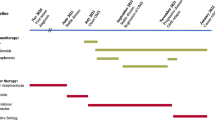Abstract
We report a case of the paraneoplastic opsoclonus-myoclonus ataxia syndrome in a patient with non-small cell lung carcinoma, which represents a highly unusual association. The patient simultaneously manifested both severe neurologic symptoms and widely metastatic disease, complicating her treatment.


Similar content being viewed by others
References
Darnell RB, Posner JB (2003) Paraneoplastic syndromes involving the nervous system. N Engl J Med 349:1543–1554
Musunuru K, Darnell RB (2001) Paraneoplastic neurologic disease antigens: RNA-binding proteins and signaling proteins in neuronal degeneration. Annu Rev Neurosci 24:239–262
Buckanovich RJ, Posner JB, Darnell RB (1993) Nova, the paraneoplastic Ri antigen, is homologous to an RNA-binding protein and is specifically expressed in the developing motor system. Neuron 11:657–672
Yang YY, Yin GL, Darnell RB (1998) The neuronal RNA-binding protein Nova-2 is implicated as the autoantigen targeted in POMA patients with dementia. Proc Natl Acad Sci USA 95(22):13254–13259
Luque FA, Furneaux HM, Ferziger R et al (1991) Anti-Ri: an antibody associated with paraneoplastic opsoclonus and breast cancer. Ann Neurol 29:241–251
Pittock SJ, Lucchinetti CF, Lennon VA (2003) Anti-neuronal nuclear autoantibody type 2: paraneoplastic accompaniments. Ann Neurol 53:580–587
Rajabally YA, Naz S, Farrell D, Abbott RJ (2004) Paraneoplastic brainstem encephalitis with tetraparesis in a patient with anti-Ri antibodies. J Neurol 251:1528–1529
McCabe DJ, Turner NC, Chao D (2004) Paraneoplastic “stiff person syndrome” with metastatic adenocarcinoma and anti-Ri antibodies. Neurology 62:1402–1404
Levin MC, Lee SM, Kalume F et al (2002) Autoimmunity due to molecular mimicry as a cause of neurological disease. Nat Med 8:509–513
Albert ML, Darnell JC, Bender A et al (1998) Tumor-specific killer cells in paraneoplastic cerebellar degeneration. Nat Med 4:1321–1324
Erlich R, Morrison C, Kim B et al (2004) ANNA-2: an antibody associated with paraneoplastic opsoclonus in a patient with large-cell carcinoma of the lung with neuroendocrine features—correlation of clinical improvement with tumor response. Cancer Invest 22:257–261
Acknowledgments
The authors would like to thank Dr. Robert Darnell and members of his laboratory for their advice and assistance with screening for paraneoplastic antibodies.
Author information
Authors and Affiliations
Corresponding author
Rights and permissions
About this article
Cite this article
Musunuru, K., Kesari, S. Paraneoplastic opsoclonus-myoclonus ataxia associated with non-small-cell lung carcinoma. J Neurooncol 90, 213–216 (2008). https://doi.org/10.1007/s11060-008-9650-1
Received:
Accepted:
Published:
Issue Date:
DOI: https://doi.org/10.1007/s11060-008-9650-1




